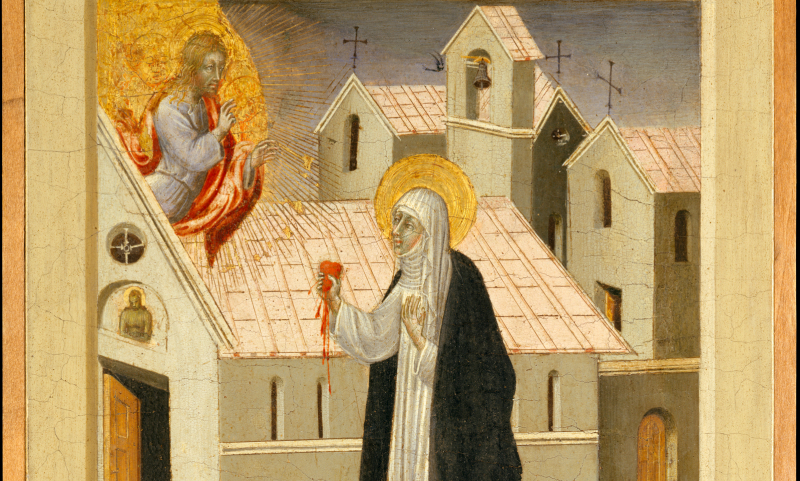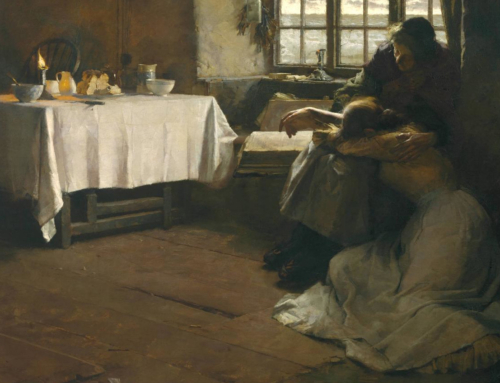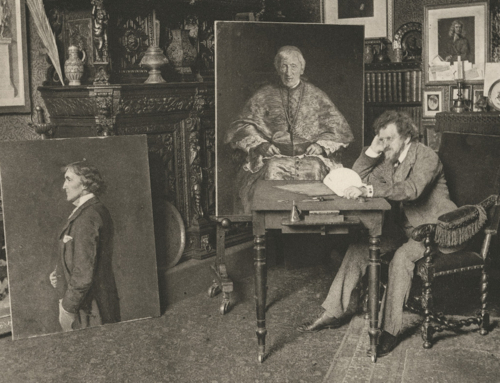There are many fascinating stories about St. Catherine of Siena. She once almost got her head cut off. Another time, she caught the head of someone else just after it was cut off. Jesus literally removed her heart and replaced it with is own; she had the scars to prove it. Demons obeyed her. Popes sought her counsel. Jesus taught her to write. She even gave up wine as a child. The list goes on.
Those accustomed to history may see this as another list of fanciful legends which time has attached to a real name. But what is unique about St. Catherine’s hagiography is that her life was written by her spiritual director, Bl. Raymond of Capua, who lived, worked, and suffered alongside her for six years. This makes his autobiography a vivid testimony to a remarkable saint. His work comes alive in unique and gripping ways.
One of the more powerful themes in Bl. Raymond’s writing is that of Catherine’s extreme devotion. Every waking moment of hers, ill or healthy, alone or with others, was devoted to God. Sometimes this took the form of tireless service to neighbor, sometimes of ecstatic prayer, sometimes of preaching. Through it all she was permeated with a positive desire to suffer for the good of God’s kingdom. She was so distressed by the sin in the world that she would suffer anything alongside Jesus so as to join in his redemptive passion.
One of my favorite stories about her is one that, unfortunately, I seldom hear told. Bl. Raymond recounts for us a conversation he had with her about Jesus’ prayer in Gethsemane. She explained to him that Jesus from the moment of his conception was perfect, and so always desired, with everything he had, to complete his mission, up to and including his passion and death. This desire, while unfulfilled, led to an immense suffering. When he prayed in Gethsemane, “Let this cup pass from me” (Mt 26:39), he was not asking for a reprieve from death, but rather, that the agony of his incomplete mission might be removed soon, by his final passion. But, in obedience, he accepted whatever timing the Father might choose, adding “But not what I will, but what you will” (Mt 26:39). In St. Catherine’s view, Jesus’ pain stemmed not from a fear of death, but from the very opposite, from his having something more to suffer.
Catherine’s desire to suffer for God was so great that she could see in Jesus a desire only to drain his cup of suffering by completing God’s plan. In her mind, Jesus, as a man, could never have desired to leave the cup undrunk. We can imagine both Jesus and Catherine thinking no thought that was not directed to their final goal, ready to face all obstacles in order to suffer what must be suffered. I hesitate to pass judgment over the validity of the exegesis, but it certainly shows a remarkable woman.
Raymond himself was incredulous when she told this to him. He explained to her how all the doctors interpreted it, that Jesus was, as a man, naturally afraid of death, and that he spoke on behalf of all the elect in order to encourage them. Catherine only answered that Scripture can speak to the weak and the strong in different ways, appropriate to each. The interpretation that made sense to Catherine was one of a Jesus who desired to suffer. But Scripture speaks to everyone. Raymond recounts that he was then silenced by her wisdom. The story had a similar effect on me.
You can learn a lot about someone from what they think of Jesus. For this reason, I think this story holds a high place in understanding St. Catherine. It may not be as exciting as some of her escapades across fourteenth century Europe; it may seem less heroic than her grand acts of mortification. But it deserves a higher place than it has received amidst all the stories of saints that dwell in popular memory, decorating religion classes and homilies and children’s books. St. Catherine, pray for us!
✠
Image: Giovanni di Paolo, Saint Catherine of Siena Exchanging Her Heart with Christ







